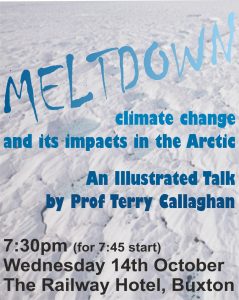
We arrange talks and presentations on a fairly regular basis, our past speakers have included among others: Andrew Simms (author of Tescopoly and other books); Professor Terry Callaghan (professor of Arctic Ecology); Nick Parsons (South Yorkshire Energy Centre); Professor J.P.Grime (Sheffield University and Harpur Hill Research Centre); Professor Bill McGuire (UCL and author of a number of books).
Talk on the and implications of the 2015 Paris Climate Agreement
On 16th May, Mat Paterson, Professor of International Politics at Manchester University, spoke from his vast experience about the impact and implications of the 2015 Paris Climate Agreement. This far reaching Agreement ‘changes everything’ in the politics of climate change and thus has major implications for the work of bodies like transition towns. Rather than pioneers calling for the danger to be recognised, we are (or have the opportunity to be) now part of a vast process of change, to adjust to an existential challenge.
That the Paris Agreement is a major success story owes much to the unrelenting work of the French behind the scenes over many months to ensure that there was a meaningful agreement (where Copenhagen failed). The issues are daunting. For example, China (and others) can no longer say: ‘we are a poor developing country that should be exempt from the obligation to cut carbon emissions.’ On the other hand, China is the world’s biggest exporter of solar panels. One should not worry too much about the USA Administration’s stance – for historical reasons, they are very wary of international treaties.
The basic concept is one that has worked for other (much less complex) environmental issues such as acid rain and water pollution. A ‘bottom up’ approach. Rather than all countries being required to do the same, each decides what obligations to take on to help meet the common goal. In this case, the goal is radical: that the world has to reach net zero carbon emissions. Forget 60%, forget 80%. 100% reductions means no one is let off the hook. This is the only way, according to the current science, that it is likely that mean temperature rise above pre-industrial can now be kept below 2⁰C. The Agreement is also to aim for 1.5⁰C rise but, given that the current rise is about 1.1⁰C, Prof Mat does not see how that is practicable.
So countries commit to their own NDCs but every three years they meet, update, review, tighten these. Unfortunately the present Nationally Determined Contributions do not yet ‘add up’. In fact, unless they are significantly tightened, we could still end up with a dangerous temperature rise of 3.5⁰C. However, the point of the strategy is that the commitments will remain under review. Even so, some implications are already clear: fossil fuels will soon come to an end, much of coal is a ‘stranded asset’, forget ‘peak oil’ as a hope for putting pressure on consumption.
Paris is far from the only ‘game in town’. Things are really changing. Insurers are very worried. Companies are already reporting on the risks (e.g. the effect of a levy on coal). The world’s 40 biggest cities have formed a network to work on the issues.
What are the implications for activists like transition and sustainability towns? This endeavour is far more complex than anything humanity has ever attempted. We do not know how it will work. We don’t know what will work or how things will interact. There is no ‘miracle’. There is no single solution, just a complex of solutions. We need to think about how a de-carbonised Buxton could work. [One point that rose in Q&A was that zero carbon power generation is only half the story; a harder problem is zero-carbon manufacture e.g. at the moment the carbon emitted in making a car is roughly the same as the carbon emitted from burning fuel over the life-time of the vehicle. Yet we have come to depend on cars, let alone shipping of goods round the world and flying.]
We need radical solutions e.g. reforest the upland areas of the Peak District, e.g. biomass power generation with carbon storage. Community initiatives/owned power generation makes sense.
In getting the message across remember that different people are persuaded by different kinds of stories. What is the future of the political ideology of choice?
There is one big question we (as transitioners) have to answer. Do we put time and effort into reducing our personal carbon foot-print OR into changing things collectively that will have a systemic effect?
Matthew Paterson is Professor of International Politics at the University of Manchester. He has researched and taught climate change politics for
nearly thirty years. He has worked variously on the UNFCCC, initiatives by NGOs, businesses, cities and others working transnational, the role of key industries, and the politics of carbon markets. His current research focuses on the cultural-political conflicts generated by the transition to a low- or zero-carbon society. He was a Lead Author for the UN’s Intergovernmental Panel on Climate Change’s Fifth Assessment Report in 2014.
